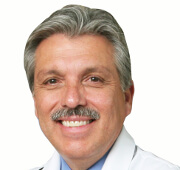
In fact, women in developed countries like the United States tend to have higher rates of breast cancer because of diet and other factors, and conventional or orthodox treatment—chemotherapy, radiation and surgery—remains primitive because of the catastrophic effects it can have on patients.
The best and brightest in the medical community need to embrace a more holistic approach. This was never clearer to me than when I was a medical student. My late father, Dr. Ernesto Contreras Sr., was accepted as a keynote speaker at a World Congress on Cancer, subject to a peer review by oncologists at the famed Memorial Sloan-Kettering Cancer Center in New York.
At the start of our meeting, my father put up a diagnostic chest X-ray alongside a post-treatment X-ray of one of our patients, with both X-rays showing a tumor. One of the oncologists, apparently perturbed, stood up and said, “That’s not a successful case.”
He left the room and returned with X-rays of one of his own patients. The diagnostic X-ray showed a tumor, and the post-treatment X-ray did not. My father congratulated the doctor and asked how the patient was doing.
The oncologist said, “The patient died, but the treatment was successful.”
My father pointed out that, even though cancer was still present in the X-rays he presented, the X-rays were taken 10 years apart, and the patient continued to live and work with the cancer completely under control.
The Sloan-Kettering oncologist, like many other doctors, treated the tumor, not the patient.
Patients who have found a way to peacefully coexist with cancer would disagree with that approach. Truly humane cancer therapy should address the psychological and spiritual well-being of cancer patients, helping them to maintain a hopeful and reasonably cheerful attitude even if the chance of a definitive “cure” must realistically be viewed as small.
True hope comes from the knowledge that, through Christ, we are eternal beings and that death is not the end, but a transition. After all, we know that we are not going to live forever, but most well-adjusted people learn to enjoy life and be grateful for the time that they have on Earth. There is no reason that cancer patients should be any different, provided that appropriate measures are taken to minimize the pain and disability that often accompany cancer and cancer treatment.
In broad terms, there are two approaches to treating cancer —conventional and alternative.
Conventional therapies can destroy the quality of a person’s life; they may even kill the patient as well as the cancer. Chemotherapy is actually a product of the use of mustard gas in the world wars.
Alternative medicine is used in place of conventional treatment. One example would be using a special diet to treat cancer instead of a method that an oncologist suggests. The American Medical Association routinely condemns such cancer treatments as quackery.
But the truth of the matter is that there are advantages to both approaches. The wise choice is to combine the best of conventional and alternative treatments — it’s called integrative medicine. Stressing prevention and self-care, it neither rejects conventional medicine nor blindly accepts alternative practices.
According to the American Association of Integrative Medicine, health is more than the absence of disease and a multi-disciplinary approach provides the maximum therapeutic benefit.
Several years ago, I participated in a panel discussion on the relative merits of orthodox and alternative therapies.
One of the organizers, unsure which side I was on after my seemingly conflicting comments, asked, “Which is it, do you practice alternative medicine or orthodox medicine?”
I replied, “I do not want to practice orthodox or alternative medicine. I only want to practice good medicine.”
With more than 200,000 women in the United States expected to be diagnosed with breast cancer this year, that’s good to remember.
Dr. Francisco Contreras is president, director and chairman of Oasis of Hope Health Group, which has offices in Mexico and California, and the co-author of the book, Beating Cancer, coming in January from Strang Book Group.














































